
Michael Faraday was an English physicist and chemist who contributed to the study of electromagnetism and electrochemistry. His main discoveries include the principles underlying electromagnetic induction, diamagnetism and electrolysis. Although Faraday received little formal education, as a self-made man, he was one of the most influential scientists in history. It was by his research on the magnetic field around a conductor carrying a direct current that Faraday established the concept of the electromagnetic field in physics. Faraday also established that magnetism could affect rays of light and that there was an underlying relationship between the two phenomena. He similarly discovered the principles of electromagnetic induction, diamagnetism, and the laws of electrolysis. His inventions of electromagnetic rotary devices formed the foundation of electric motor technology, and it was largely due to his efforts that electricity became practical for use in technology.

The American Chemical Society (ACS) is a scientific society based in the United States that supports scientific inquiry in the field of chemistry. Founded in 1876 at New York University, the ACS currently has more than 155,000 members at all degree levels and in all fields of chemistry, chemical engineering, and related fields. It is one of the world's largest scientific societies by membership. The ACS is a 501(c)(3) non-profit organization and holds a congressional charter under Title 36 of the United States Code. Its headquarters are located in Washington, D.C., and it has a large concentration of staff in Columbus, Ohio.

The Royal Society of Chemistry (RSC) is a learned society and professional association in the United Kingdom with the goal of "advancing the chemical sciences". It was formed in 1980 from the amalgamation of the Chemical Society, the Royal Institute of Chemistry, the Faraday Society, and the Society for Analytical Chemistry with a new Royal Charter and the dual role of learned society and professional body. At its inception, the Society had a combined membership of 49,000 in the world.

The Davy Medal is awarded by the Royal Society of London "for an outstandingly important recent discovery in any branch of chemistry". Named after Humphry Davy, the medal is awarded with a monetary gift, initially of £1000. Receiving the Davy Medal has been identified as a potential precursor to being awarded the Nobel Prize in Chemistry, with 22 scientists as of 2022 having been awarded the medal prior to becoming Nobel laureates, according to an analysis by the Royal Society of Chemistry.

Chemical Society Reviews is a biweekly peer-reviewed scientific journal published by the Royal Society of Chemistry, for review articles on topics of current interest in chemistry. Its predecessors were Quarterly Reviews, Chemical Society (1947–1971) and Royal Institute of Chemistry, Reviews (1968–1971); it maintained its current title since 1972. According to the Journal Citation Reports, the journal has a 2021 impact factor of 60.615. The current editor-in-chief is Jennifer Love.

Dalton Transactions is a weekly peer-reviewed scientific journal covering original (primary) research and review articles on all aspects of the chemistry of inorganic, bioinorganic, and organometallic compounds. It is published by the Royal Society of Chemistry and the editor-in-chief is Russell Morris. The journal was named after the English chemist, John Dalton, best known for his work on modern atomic theory. The journal was named a "rising star" in 2006.
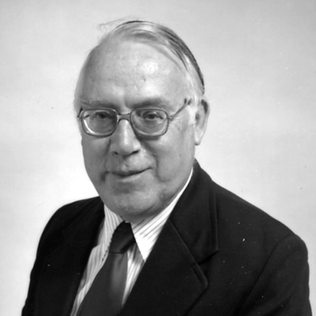
Jeffrey Barry Harborne FRS was a British chemist who specialised in phytochemistry. He was Professor of Botany at the University of Reading, 1976–93, then Professor emeritus. He contributed to more than 40 books and 270 research papers and was a pioneer in ecological biochemistry, particularly in the complex chemical interactions between plants, microbes and insects.
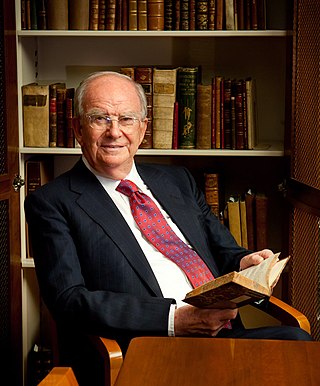
Sir John Meurig Thomas, also known as JMT, was a Welsh scientist, educator, university administrator, and historian of science primarily known for his work on heterogeneous catalysis, solid-state chemistry, and surface and materials science.

George McClelland Whitesides is an American chemist and professor of chemistry at Harvard University. He is best known for his work in the areas of nuclear magnetic resonance spectroscopy, organometallic chemistry, molecular self-assembly, soft lithography, microfabrication, microfluidics, and nanotechnology. A prolific author and patent holder who has received many awards, he received the highest Hirsch index rating of all living chemists in 2011.
The Royal United Services Institute is a defence and security think tank with its headquarters in London, United Kingdom. It was founded in 1831 by the Duke of Wellington, Arthur Wellesley. The institution was registered as Royal United Service Institute for Defence and Security Studies and formerly known as the Royal United Services Institute for Defence Studies. The current president of RUSI is the Duke of Kent and its director-general is Karin von Hippel.

CrystEngComm is a peer-reviewed online-only scientific journal publishing original research and review articles on all aspects of crystal engineering including properties, polymorphism, target materials, and crystalline nanomaterials. It is published biweekly by the Royal Society of Chemistry and the editor-in-chief is Pierangelo Metrangolo. According to the Journal Citation Reports, the journal has a 2021 impact factor of 3.756. CrystEngComm has a close association with the virtual web community, CrystEngCommunity.
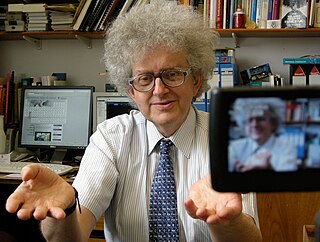
Sir Martyn Poliakoff is a British chemist known for his work on green chemistry and for being the main presenter on the popular YouTube channel Periodic Videos. The core subjects of his academic work are supercritical fluids, infrared spectroscopy and lasers. He is a research professor in chemistry at the University of Nottingham. As well as carrying out research at the University of Nottingham, he is a lecturer, teaching a number of modules including green chemistry.
The Journal of the Brazilian Chemical Society is a Brazilian scientific journal in chemistry. It was founded in 1990 and is published by the Brazilian Society of Chemistry, located at the Instituto de Química da Universidade de São Paulo. The journal is online, and the full text is freely available. According to the Journal Citation Reports, the journal has a 2014 impact factor of 1.129, ranking it 100th out of 157 journals in the category "Chemistry Multidisciplinary".
The International Journal of Molecular Sciences is a peer-reviewed open access scientific journal covering research in chemistry, molecular physics, and molecular biology. It is published by MDPI and was established in 2000. The journal is considered one of MDPI's flagship publications.

Journal of Chemical Theory and Computation is a peer-reviewed scientific journal, established in 2005 by the American Chemical Society. It is indexed in Chemical Abstracts Service (CAS), Scopus, British Library, and Web of Science. The current editor-in-chief is Laura Gagliardi. Currently as of the year 2022, JCTC has 18 volumes.

Astronomy & Geophysics (A&G) is a scientific journal and trade magazine published on behalf of the Royal Astronomical Society (RAS) by Oxford University Press. It is distributed bimonthly to members of the RAS.
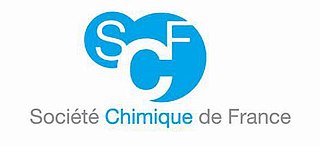
The Société Chimique de France (SCF) is a learned society and professional association founded in 1857 to represent the interests of French chemists in a variety of ways in local, national and international contexts. Until 2009 the organization was known as the Société Française de Chimie.
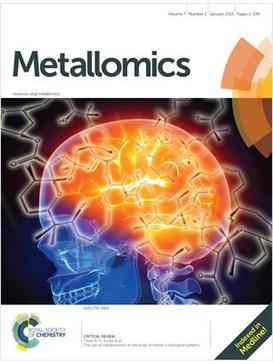
Metallomics is a monthly peer-reviewed scientific journal covering the growing research field of metallomics. The journal's scope is aimed at "elucidating the identification, distribution, dynamics, role and impact of metals and metalloids in biological systems". It is published by the Royal Society of Chemistry. The executive editor is Jeanne Andres, while the current chair of the editorial board is David Giedroc at Indiana University Bloomington.

Ganapati Dadasaheb Yadav is an Indian chemical engineer, inventor and academic, known for his research on nanomaterials, gas absorption with chemical reaction and phase transfer catalysis. He served as the vice chancellor of the Institute of Chemical Technology, Mumbai from 2009 until November 2019. He is currently the Emeritus Professor of Eminence at ICT Mumbai.
















